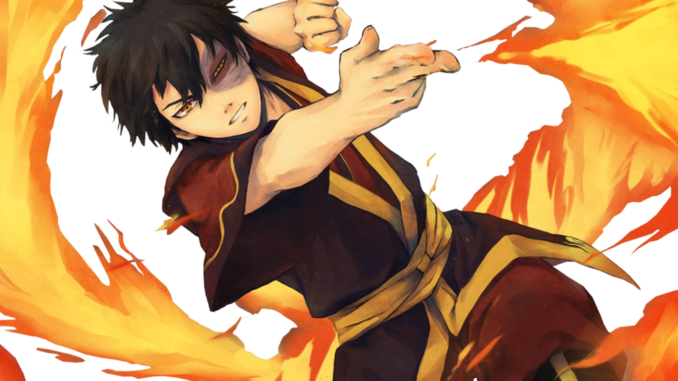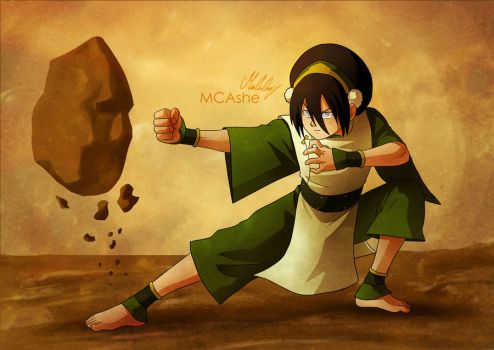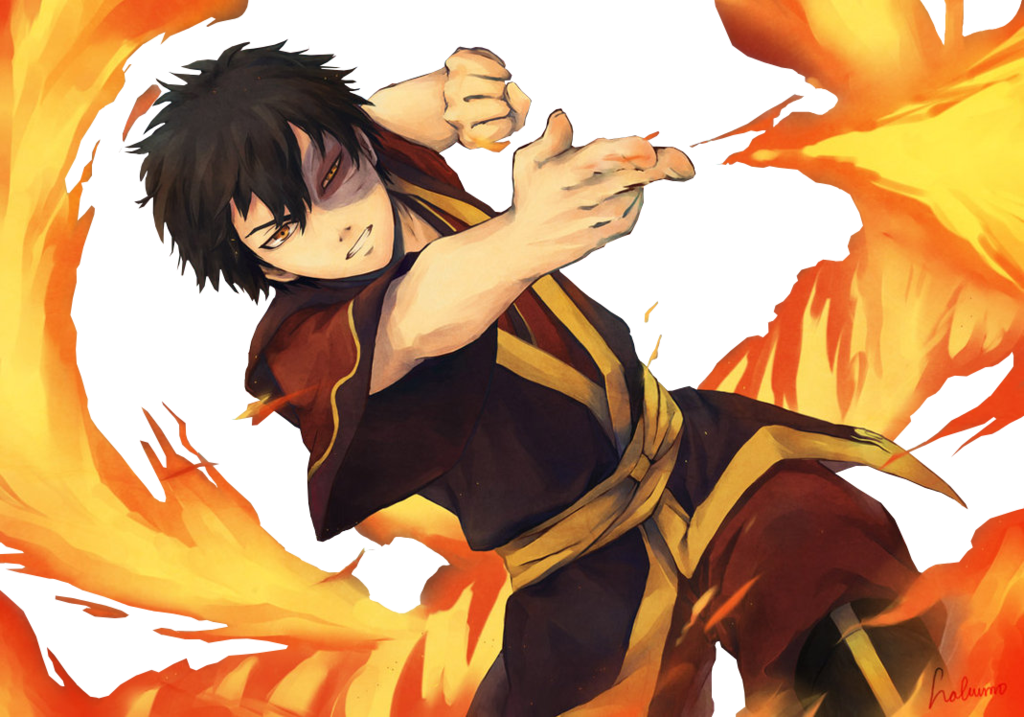
This week we finish taking a look at the four major element benders from Nickolodeon’s Avatar: The Last Airbender series as envisioned as archetypes for 5th Edition Dungeons and Dragons. As discussed in the previous installment, I was struck with the inspiration for the idea after seeing the four new elemental control cantrips in Xanathar’s Guide to Everything and realized that they were just begging to be paired with the Way of the Four Elements path for Monks to create fully realized element benders capable of performing quite a few feats we see in the show in a given adventuring day. Unlike the previous two, the following two characters started with Monk as their first level and then picked up their druid level later, as you can see from their starting proficiencies.
Earth Bender

Human (Variant) Druid 1/Way of Four Elements Monk 3
Armor Class 13
Hit Points 35 (4d8+12)
Proficiency Bonus +2
Speed 40 ft
Alignment neutral good
Languages Common, Giant
Ability Scores
Strength 10 (+0)
Dexterity 15 (+2)
Constitution 17 (+3)
Intelligence 8 (-1)
Wisdom 13 (+1)
Charisma 12 (+1)
Attacks
Melee Attack: Unarmed Strike +4 1d4+2 bludgeoning damage.
Melee Attack: Light Hammer +4 1d4+2 bludgeoning damage, light, thrown (20/60)
Ranged Attack: Dart +4 1d4+2 piercing damage, finesse, thrown (20/60)
Skills Acrobatics +4, Animal Handling +1, Arcana -1, Athletics +2, Deception +1, History -1, Insight +1, Intimidation +3, Investigation -1, Medicine +1, Nature -1, Perception +1, Performance +1, Persuasion +1, Religion -1, Sleight of Hand +2, Stealth +4, Survival +3
Equipment light hammer, dungeoneer’s pack, 10 darts, staff, hunting trap, elkhorn charms, set of traveler’s clothes, belt pouch with 10 gp.
Feats
Durable. Hardy and resilient, you gain the following benefits:
- Increase your Constitution score by 1, to a maximum of 20.
- When you roll a Hit Die to regain hit points, the minimum number of hit points you regain from the roll equals twice your Constitution modifier (minimum of 2).
Class Features
Proficiencies
Armor Proficiencies: Light armor, medium armor, shields (druids will not wear armor or use shields made of metal)
Weapon Proficiencies: Simple weapons, shortswords
Tool Proficiencies: Bagpipes, calligrapher’s set
Saving Throws: Strength and Dexterity
Skill Proficiencies: Acrobatics, Athletics, Intimidation, Stealth, Survival
Druidic: You know Druidic, the secret language of druids. You can speak the language and use it to leave hidden messages. You and others who know this language automatically spot such a message. Others spot the message’s presence with a successful DC 15 Wisdom (Perception) check but can’t decipher it without magic.
Spellcasting: Your spellcasting ability is Wisdom. Your spell save DC is 12 and your spell attack modifier is +4. You can cast a spell with the ritual tag as a ritual if you have it prepared. You typically have the following spells prepared.
Cantrips: druidcraft, mold earth
1st level: earth tremor, entangle
Unarmored Defense: While you are wearing no armor and not wielding a shield, your AC equals 10 + your Dexterity modifier + your Wisdom modifier.
Martial Arts: Your practice of martial arts gives you mastery of combat styles that use unarmed strikes and monk weapons, which are shortswords and any simple melee weapons that don’t have the two-handed or heavy properties. You can use Dexterity instead of Strength for the attack and damage rolls of your unarmed strikes and monk weapons. You can roll a d4 in place of the normal damage of your unarmed strike or monk weapon. This die changes as you gain monk levels. When you use the Attack action with an unarmed strike or a monk weapon on your turn, you can make one unarmed strike as a bonus action. For example, if you take the Attack action and attack with a quarterstaff, you can also make an unarmed strike as a bonus action, assuming you haven’t already taken a bonus action this turn.
Ki: You have a reserve of Ki points equal to your Monk level. You can spend these points to fuel various ki features. When you spend a ki point, it is unavailable until you finish a short or long rest, at the end of which you draw all of your expended ki back into yourself. You must spend at least 30 minutes of the rest meditating to regain your ki points. If the ki feature requires the target to make a saving throw, the DC is 12.
- Flurry of Blows: Immediately after you take the Attack action on your turn, you can spend 1 ki point to make two unarmed strikes as a bonus action.
- Patient Defense: You can spend 1 ki point to take the Dodge action as a bonus action on your turn.
- Step of the Wind: You can spend 1 ki point to take the Disengage or Dash action as a bonus action on your turn, and you jump distance is doubled for the turn.
Unarmored Movement: Your speed increases by 10 feet while you are not wearing armor or wielding a shield. This bonus increases when you reach certain monk levels.
Deflect Missiles: You can use your reaction to deflect or catch the missile when you are hit by a ranged weapon attack. When you do so, the damage you take from the attack is reduced by 1d10 + your Dexterity modifier + your monk level. If you reduce the damage to 0, you can catch the missile if it is small enough for you to hold in one hand and you have at least one hand free. If you catch a missile in this way, you can spend 1 ki point to make a ranged attack with the weapon or piece of ammunition you just caught, as part of the same reaction. You make this attack with proficiency, regardless of your weapon proficiencies, and the missile counts as a monk weapon for the attack.
Disciple of the Elements: You have learned magical disciplines that harness the power of the four elements. A discipline requires you to spend ki points each time you use it. If an elemental discipline allows you to cast a spell, you use its casting time and other rules, but you don’t need to provide material components for it.
- Elemental Attunement: You can use your action to briefly control elemental forces nearby, causing one of the following effects of your choice: Create a harmless, instantaneous sensory effect related to air, earth, fire, or water, such as a shower of sparks, a puff of wind, a spray of light mist, or a gentle rumbling of stone. Instantaneously light or snuff out a candle, torch, or small campfire. Chill or warm up to 1 pound of nonliving material for up to 1 hour. Cause earth, fire, water, or mist that can fit within a 1-foot cube to shape itself into a crude form you designate for 1 minute.
- Fist of Four Thunders: You can spend 2 ki points to cast thunderwave.
Background: Outlander (Outcast)
Wanderer. You have an excellent memory for maps and geography, and you can always recall the general layout of terrain, settlements, and other features around you. In addition, you can find food and fresh water for yourself and up to five other people each day, provided that the land offers berries, small game, water, and so forth.
Personality Traits: I’m always picking things up, absently fiddling with them, and sometimes accidentally breaking them.
Ideals: Greater Good. It is each person’s responsibility to make the most happiness for the whole tribe.
Bonds: I suffer awful visions of a coming disaster and will do anything to prevent it.
Flaws: I remember every insult I’ve received and nurse a silent resentment toward anyone who’s ever wronged me.
Fire Bender

Human (Variant) Druid 1/Way of Four Elements Monk 3
Armor Class 13
Hit Points 27 (4d8+4)
Proficiency Bonus +2
Speed 40 ft
Alignment neutral
Languages Common, Dwarven
Ability Scores
Strength 16 (+3)
Dexterity 13 (+1)
Constitution 12 (+1)
Intelligence 10 (+0)
Wisdom 15 (+2)
Charisma 8 (-1)
Attacks
Melee Attack: Unarmed Strike +5 1d4+3 bludgeoning damage.
Melee Attack: Shortsword +5 1d6+3 piercing damage.
Ranged Attack: Dart +5 1d4+3 piercing damage, finesse, thrown (20/60)
Skills Acrobatics +3, Animal Handling +2, Arcana +0, Athletics +5, Deception -1, History +0, Insight +2, Intimidation +1, Investigation +0, Medicine +2, Nature +0, Perception +2, Performance -1, Persuasion -1, Religion +0, Sleight of Hand +1, Stealth +3, Survival +2
Equipment short sword, explorer’s pack, 10 darts, insignia or rank, earth monk stone sphere, set of bone dice, set of common clothes, belt pouch with 10 gp.
Feats
Charger. When you use your action to Dash, you can use a bonus action to make one melee weapon attack or to shove a creature. If you move at least 10 feet in a straight line immediately before taking this bonus action, you either gain a +5 bonus to the attack’s damage roll (if you chose to make a melee attack and hit) or push the target up to 10 feet away from you (if you chose to shove and you succeed).
Class Features
Proficiencies
Armor Proficiencies: Light armor, medium armor, shields (druids will not wear armor or use shields made of metal)
Weapon Proficiencies: Simple weapons, shortswords
Tool Proficiencies: Drum, dice, vehicles (land)
Saving Throws: Strength and Dexterity
Skill Proficiencies: Acrobatics, Athletics, Intimidation, Perception, Stealth
Druidic: You know Druidic, the secret language of druids. You can speak the language and use it to leave hidden messages. You and others who know this language automatically spot such a message. Others spot the message’s presence with a successful DC 15 Wisdom (Perception) check but can’t decipher it without magic.
Spellcasting: Your spellcasting ability is Wisdom. Your spell save DC is 12 and your spell attack modifier is +4. You can cast a spell with the ritual tag as a ritual if you have it prepared. You typically have the following spells prepared.
Cantrips: control flame, produce flace
1st level: absorb elements, fairie fire, longstrider
Unarmored Defense: While you are wearing no armor and not wielding a shield, your AC equals 10 + your Dexterity modifier + your Wisdom modifier.
Martial Arts: Your practice of martial arts gives you mastery of combat styles that use unarmed strikes and monk weapons, which are shortswords and any simple melee weapons that don’t have the two-handed or heavy properties. You can use Dexterity instead of Strength for the attack and damage rolls of your unarmed strikes and monk weapons. You can roll a d4 in place of the normal damage of your unarmed strike or monk weapon. This die changes as you gain monk levels. When you use the Attack action with an unarmed strike or a monk weapon on your turn, you can make one unarmed strike as a bonus action. For example, if you take the Attack action and attack with a quarterstaff, you can also make an unarmed strike as a bonus action, assuming you haven’t already taken a bonus action this turn.
Ki: You have a reserve of Ki points equal to your Monk level. You can spend these points to fuel various ki features. When you spend a ki point, it is unavailable until you finish a short or long rest, at the end of which you draw all of your expended ki back into yourself. You must spend at least 30 minutes of the rest meditating to regain your ki points. If the ki feature requires the target to make a saving throw, the DC is 12.
- Flurry of Blows: Immediately after you take the Attack action on your turn, you can spend 1 ki point to make two unarmed strikes as a bonus action.
- Patient Defense: You can spend 1 ki point to take the Dodge action as a bonus action on your turn.
- Step of the Wind: You can spend 1 ki point to take the Disengage or Dash action as a bonus action on your turn, and you jump distance is doubled for the turn.
Unarmored Movement: Your speed increases by 10 feet while you are not wearing armor or wielding a shield. This bonus increases when you reach certain monk levels.
Deflect Missiles: You can use your reaction to deflect or catch the missile when you are hit by a ranged weapon attack. When you do so, the damage you take from the attack is reduced by 1d10 + your Dexterity modifier + your monk level. If you reduce the damage to 0, you can catch the missile if it is small enough for you to hold in one hand and you have at least one hand free. If you catch a missile in this way, you can spend 1 ki point to make a ranged attack with the weapon or piece of ammunition you just caught, as part of the same reaction. You make this attack with proficiency, regardless of your weapon proficiencies, and the missile counts as a monk weapon for the attack.
Disciple of the Elements: You have learned magical disciplines that harness the power of the four elements. A discipline requires you to spend ki points each time you use it. If an elemental discipline allows you to cast a spell, you use its casting time and other rules, but you don’t need to provide material components for it.
- Elemental Attunement: You can use your action to briefly control elemental forces nearby, causing one of the following effects of your choice: Create a harmless, instantaneous sensory effect related to air, earth, fire, or water, such as a shower of sparks, a puff of wind, a spray of light mist, or a gentle rumbling of stone. Instantaneously light or snuff out a candle, torch, or small campfire. Chill or warm up to 1 pound of nonliving material for up to 1 hour. Cause earth, fire, water, or mist that can fit within a 1-foot cube to shape itself into a crude form you designate for 1 minute.
- Fangs of the Fire Snake: When you use the Attack action on your turn, you can spend 1 ki point to cause tendrils of flame to stretch out from your fists and feet. Your reach with your unarmed strikes increases by 10 feet for that action, as well as the rest of the turn. A hit with such an attack deals fire damage instead of bludgeoning damage, and if you spend 1 ki point when the attack hits, it also deals an extra 1d10 fire damage.
Background: Soldier (Infantry)
Military Rank. You have a military rank from your career as a soldier. Soldiers loyal to your former military organization still recognize your authority and influence, and they defer to you if they are of a lower rank. You can invoke your rank to exert influence over other soldiers and requisition simple equipment or horses for temporary use. You can also usually gain access to friendly military encampments and fortresses where your rank is recognized.
Personality Traits: I can stare down a hellhound without flinching.
Ideals: Might. In life as in war, the stronger force wins.
Bonds: I’ll never forget the crushing defeat my company suffered or the enemies who dealt it.
Flaws: I have little respect for anyone who is not a proven warrior.
